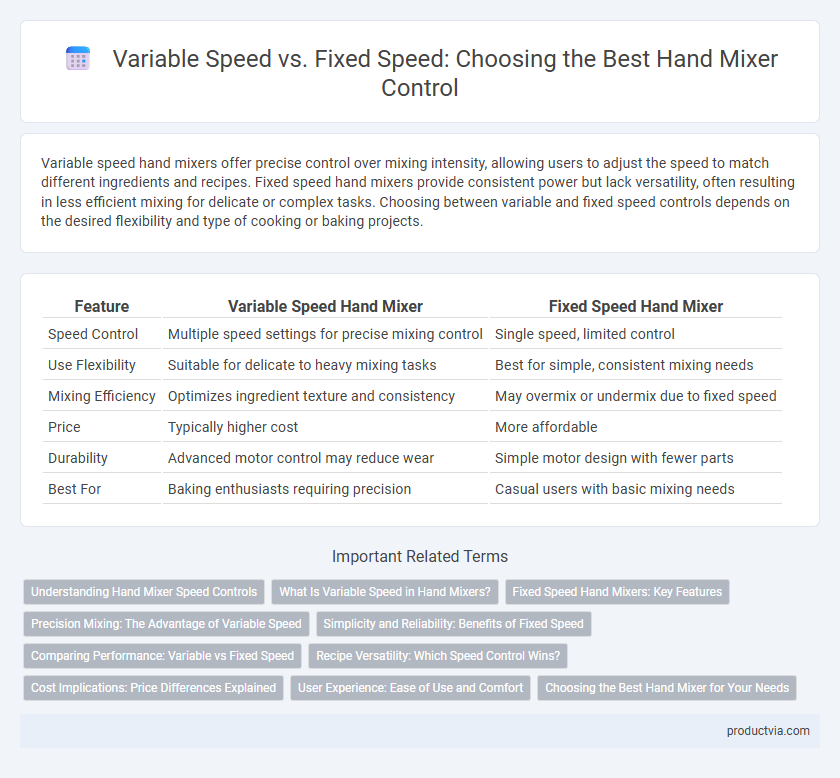Variable speed hand mixers offer precise control over mixing intensity, allowing users to adjust the speed to match different ingredients and recipes. Fixed speed hand mixers provide consistent power but lack versatility, often resulting in less efficient mixing for delicate or complex tasks. Choosing between variable and fixed speed controls depends on the desired flexibility and type of cooking or baking projects.
Table of Comparison
| Feature | Variable Speed Hand Mixer | Fixed Speed Hand Mixer |
|---|---|---|
| Speed Control | Multiple speed settings for precise mixing control | Single speed, limited control |
| Use Flexibility | Suitable for delicate to heavy mixing tasks | Best for simple, consistent mixing needs |
| Mixing Efficiency | Optimizes ingredient texture and consistency | May overmix or undermix due to fixed speed |
| Price | Typically higher cost | More affordable |
| Durability | Advanced motor control may reduce wear | Simple motor design with fewer parts |
| Best For | Baking enthusiasts requiring precision | Casual users with basic mixing needs |
Understanding Hand Mixer Speed Controls
Hand mixer speed controls typically come in variable speed and fixed speed options, each influencing baking precision and versatility. Variable speed hand mixers offer adjustable settings, allowing users to tailor mixing intensity to specific ingredients and recipes, enhancing control and consistency. Fixed speed mixers, while simpler, maintain a single mixing pace that may suffice for basic tasks but lacks the adaptability required for more delicate or complex culinary techniques.
What Is Variable Speed in Hand Mixers?
Variable speed in hand mixers refers to the ability to adjust the mixing speed according to the recipe's requirements, offering precise control over the consistency and texture of ingredients. This feature allows users to start mixing slowly to prevent splattering and gradually increase speed for thorough blending, making it ideal for various tasks from whipping cream to kneading dough. Variable speed hand mixers provide versatility and efficiency by accommodating different mixing needs with a single appliance.
Fixed Speed Hand Mixers: Key Features
Fixed speed hand mixers provide consistent power output, ideal for straightforward mixing tasks such as whipping cream or beating eggs. Their simple controls ensure ease of use and durability, reducing mechanical complexity and potential maintenance issues. These mixers usually feature a single-speed setting that delivers reliable performance for basic kitchen needs.
Precision Mixing: The Advantage of Variable Speed
Variable speed hand mixers offer superior precision mixing by allowing users to adjust speeds according to ingredient sensitivity and recipe requirements, reducing overmixing and ensuring consistent texture. Fixed speed mixers operate at a single setting, limiting control and increasing the risk of uneven mixing or ingredient damage. Precision control in variable speed mixers enhances versatility for tasks ranging from gentle folding to vigorous whipping.
Simplicity and Reliability: Benefits of Fixed Speed
Fixed speed hand mixers offer unparalleled simplicity, making them easy to use without adjusting settings. Their straightforward design enhances reliability by minimizing mechanical components prone to failure. This durability ensures consistent performance, ideal for users seeking hassle-free operation and long-lasting kitchen tools.
Comparing Performance: Variable vs Fixed Speed
Variable speed hand mixers offer superior control over mixing consistency and texture by allowing users to adjust the beaters' speed according to recipe requirements, resulting in more precise blending and reduced risk of overmixing. Fixed speed hand mixers provide simplicity and reliability but lack flexibility, often leading to less optimal performance when handling diverse ingredients or complex recipes. Performance comparisons indicate that variable speed mixers enhance user experience and culinary outcomes by accommodating a wider range of mixing speeds and techniques.
Recipe Versatility: Which Speed Control Wins?
Variable speed hand mixers offer superior recipe versatility by allowing precise control over mixing speeds, accommodating delicate tasks like folding egg whites as well as vigorous whipping of cream. Fixed speed mixers limit functionality to one consistent speed, often resulting in less optimal texture and mixing outcomes for diverse recipes. For home bakers seeking adaptability and professional-quality results, variable speed controls are the preferred choice.
Cost Implications: Price Differences Explained
Variable speed hand mixers typically cost more due to advanced motor technology and enhanced control features, offering precise mixing for diverse recipes. Fixed speed models are budget-friendly, designed for basic blending tasks without speed adjustment, making them ideal for occasional use. Investing in a variable speed hand mixer may lead to long-term value by reducing the risk of overmixing and accommodating multiple culinary needs in one device.
User Experience: Ease of Use and Comfort
Variable speed hand mixers offer enhanced user experience by allowing precise control over mixing intensity, which reduces splattering and improves ingredient incorporation. Fixed speed mixers often limit flexibility, potentially causing discomfort during prolonged use due to a lack of customization in speed settings. Adjustable speed controls contribute to better ergonomics and ease of use, catering to diverse recipe requirements and user preferences.
Choosing the Best Hand Mixer for Your Needs
Hand mixers with variable speed controls provide precision for different mixing tasks, allowing adjustments from slow stirring to high-speed whipping, ensuring consistent results. Fixed speed hand mixers offer simplicity and are ideal for basic mixing needs but may lack the flexibility required for complex recipes. Selecting a hand mixer depends on your cooking habits; variable speed models suit versatile kitchens, while fixed speed mixers are suitable for straightforward, occasional use.
Variable Speed vs Fixed Speed for Hand Mixer Controls Infographic

 productvia.com
productvia.com